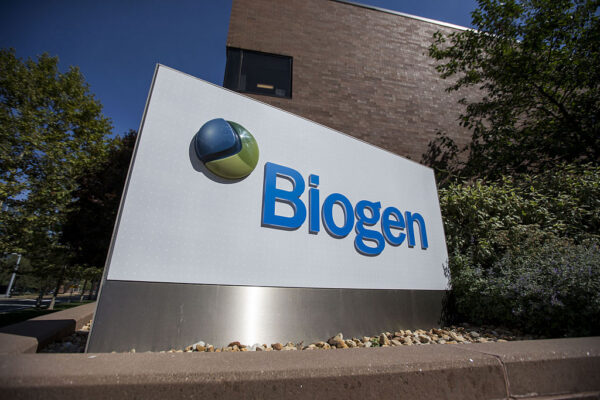
Biogen’s experimental amyotrophic lateral sclerosis drug has received FDA approval, a decision that introduces a new treatment option for the rare disease while also validating a new biological benchmark for assessing future ALS drugs.
The Tuesday regulatory decision makes the Biogen drug just the fourth approved ALS therapy and the second one to pass regulatory muster in the past eight months. But the drug, known in development as tofersen and given the brand name Qalsody, will help just a fraction of ALS patients. The drug was designed to address a rare genetic signature that the FDA estimates is found in fewer than 500 U.S. patients who have ALS.

When Investment Rhymes with Canada
Canada has a proud history of achievement in the areas of science and technology, and the field of biomanufacturing and life sciences is no exception.
Qalsody is an antisense oligonucleotide, a type of drug comprised of small pieces of DNA or RNA that bind to messenger RNA. The drug addresses ALS driven by mutations to a gene called superoxide dismutase 1 (SOD1). Normal SOD1 protein offers protective effects to cells, including neurons. However, mutated versions of SOD1 are toxic and are associated with the progressive loss of motor neurons experienced by ALS patients.
Qalsody is designed to bind to SOD1 messenger RNA, which in turn reduces synthesis of SOD1 protein. The drug is dosed as a spinal injection. Patients start with three initial doses administered every 14 days, followed by a maintenance dose every 28 days.
The Biogen drug initially failed a Phase 3 clinical trial that evaluated 108 ALS patients. While those dosed with the drug showed improvement according to a scale that assesses function in ALS patients, the changes measured at 28 weeks were not enough to be statistically significant compared to the placebo arm. However, Biogen and study investigators pointed to improvements according to secondary goals that included reductions in SOD1 in cerebrospinal fluid and reductions of neurofilaments in the blood. Neurofilaments are proteins released by damaged neurons and they are thought to be an indicator of neurodegenerative disease.
Biogen continued to treat and follow patients in an open-label extension study. At 52 weeks, results showed slower declines in respiratory function and muscle strength. These results were included in the company’s new drug application filed with the FDA last summer. The additional data were also published last September in the New England Journal of Medicine. On measures of safety, side effects reported in clinical testing include inflammation of the spinal cord, irritation of the nerve roots, swelling of the optic nerve, increased pressure inside the skull, and inflammation of the linings of the brain.

At ViVE 2024, Panelists Share Prior Authorization Progress and Frustration in Payer Insights Program
At the Payer Insights sessions on Day 1 of ViVE 2024, a panel on prior authorization offered compelling insights from speakers who shared the positive developments in this area after years of mounting frustration. Speakers also shared challenges as they work with providers to figure out how policy developments and technology will work in practice.
Approval of Qalsody is based on data from the initial 28-week study. But in granting the drug accelerated FDA approval, the agency pointed to the observed reduction in neurofilaments. The FDA said this reduction was consistent across all patient subgroups. For severe diseases with unmet medical need, the accelerated approval pathway permits the FDA to approve drugs using a surrogate endpoint, an indicator that a drug might be helping patient. In Qalsody’s case, reduction in neurofilaments is the indicator that the drug is working.
“Today also marks a pivotal moment in ALS research as we gained, for the first time, consensus that neurofilament can be used as a surrogate marker reasonable likely to predict clinical benefit in SOD1-ALS,” Biogen President and CEO Christopher Viehbacher said in a prepared statement. “We believe this important scientific advancement will further accelerate innovative drug development for ALS.”
Drugs awarded accelerated approval still must confirm their benefit to patients in larger, well-controlled clinical trials. A Phase 3 confirmatory study of Qalsody is ongoing in participants who are carriers of the SOD1 genetic mutation but have not yet developed ALS symptoms. The study goal is to measure the proportion of those treated with Qalsody who develop ALS symptoms compared to those given a placebo.
The last ALS drug to pass regulatory muster was Amylyx Pharmaceuticals’ Relyvrio, which received traditional FDA approval last September. That product, a combination of two small molecules, is intended to help improve neuron survival.
Qalsody was discovered and initially developed by Ionis Pharmaceuticals, a company specializing in antisense oligonucleotide drugs. In 2013, Ionis began a partnership with Biogen focused on neurodegenerative disorders. Biogen licensed rights to Qalsody in 2018, taking on responsibility for development, regulatory, and commercialization costs.
[Story updated with pricing information.] Biogen did not release specific pricing details for Qalsody but said the ALS drug will be priced in a range comparable to other recently launched ALS treatments. Amylyx’s Relyvrio carries a $158,000 a year wholesale price, which is just below the price of Mitsubishi Tanabe Pharma’s ALS drug Radicava.
“We believe this strikes the right balance between the scientific and clinical innovation Qalsody delivers with the need to get this treatment to patients as quickly as possible,” the company said in an emailed response to questions.
Biogen expects Qalsody will become available for shipment to healthcare providers in about one week. The availability of the therapy to patients may vary as treatment centers learn about the new product.
Photo: Scott Eisen/Bloomberg, via Getty Images












